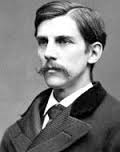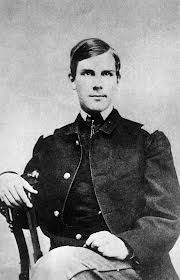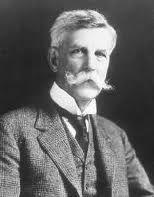 Boston Brahmin, Oliver Wendell Holmes, Jr., was not only a Union Icon, but a thrice wounded Civil War veteran, whose concept of the future of the United States would be forever sculpted by his visions and memories of the carnage, death and futility of war. In 1861, Holmes viewed the Civil War as a moral action that affirmed his beliefs in racial equality and a unified country. In late 1864, Holmes wrote his mother in Boston, “I started this thing as a boy, I am now a man. I honestly think the duty of fighting has ceased for me, ceased because I have laboriously and with much suffering of mind and body earned the right.” By the end of his service, mentally and physically exhausted, Holmes developed a harsh, unsentimental view of life, “as an endless conflict, with an individual’s destiny in the hands of an almost whimsical Fate.”
Boston Brahmin, Oliver Wendell Holmes, Jr., was not only a Union Icon, but a thrice wounded Civil War veteran, whose concept of the future of the United States would be forever sculpted by his visions and memories of the carnage, death and futility of war. In 1861, Holmes viewed the Civil War as a moral action that affirmed his beliefs in racial equality and a unified country. In late 1864, Holmes wrote his mother in Boston, “I started this thing as a boy, I am now a man. I honestly think the duty of fighting has ceased for me, ceased because I have laboriously and with much suffering of mind and body earned the right.” By the end of his service, mentally and physically exhausted, Holmes developed a harsh, unsentimental view of life, “as an endless conflict, with an individual’s destiny in the hands of an almost whimsical Fate.”
Oliver Wendell Holmes, Jr. was born in Boston on March 8, 1841. His father, Oliver Wendell Holmes, Sr., was a physician, a professor of medicine at Harvard, an author of novels, verse, humorous essays and was also a co-founder of The Atlantic Monthly. Holmes had a difficult relationship with his father, who often used his young son as
the recipient of his barbs in the Atlantic Monthly column, “The Autocrat of the Breakfast-Table.” He was his mother’s favorite child, and received his self-confidence from her.
Holmes was prepared for Harvard by E. S. Dixwell of Cambridge. Well-tutored, he excelled at Harvard, enrolling in 1857 and his closeness with the Dixwell family, led eventually to his marriage to Dixwell’s daughter, Fanny. Holmes exercised his literary talents as editor of the Harvard Magazine and in numerous essays. His graduation was even in some doubt, as he had been publicly admonished by the faculty for “disrespect” towards a professor. Shortly after the Civil War began, Holmes left Boston and Harvard, to join
the 20th Massachusetts Regiment, but because the Harvard Regiment didn’t do any fighting before graduation, the young 1st Lieutenant, was able to complete his exams and graduate in uniform.
 In October 1861, Holmes saw his first action at the Battle of Ball’s Bluff and was severely wounded in the chest. Lucky to survive and after an extensive recovery, the young 1st Lieutenant was again wounded at the Battle of Antietam, in September 1862. Holmes was wounded a third time at Chancellorsville in May of 1863 and hoped that the wound would be serious enough for him to leave the military. His experiences in the Civil War had greatly affected his view of life. After his convalescence and the three-year military commitment ended, Holmes returned to Boston rather than re-enlist.
In October 1861, Holmes saw his first action at the Battle of Ball’s Bluff and was severely wounded in the chest. Lucky to survive and after an extensive recovery, the young 1st Lieutenant was again wounded at the Battle of Antietam, in September 1862. Holmes was wounded a third time at Chancellorsville in May of 1863 and hoped that the wound would be serious enough for him to leave the military. His experiences in the Civil War had greatly affected his view of life. After his convalescence and the three-year military commitment ended, Holmes returned to Boston rather than re-enlist.
After returning to Boston, he enrolled at the Harvard Law School and graduated in 1866. Holmes briefly practiced law and then devoted the next decade to the preparation of lectures on the history and structure of the common law. Holmes believed a man had to earn his reputation before he turned 40, or he would not make it at all. Shortly before his 40th birthday, he was invited to give the Lowell Lectures. These lectures, published as The Common Law in 1881, brought him lasting fame. He emphasized both that the “life of the law has not been logic: it has been experience” and that the law develops according to the “felt necessities of the time” rather than according to any set of deductive premises.
After teaching briefly at the Harvard Law School, Holmes was appointed in 1882 to the Supreme Judicial Court of Massachusetts and in 1902, President Theodore Roosevelt appointed him to the U.S. Supreme Court, where he served as a Supreme Court Justice until 1932.
 Although many of Holmes’ most notable opinions were written as dissents, he was probably the most important member of the Court during his long tenure because these opinions reflected and shaped the consciousness of the time. Although he was far more a social Darwinist than a social reformer, his very respect for brute power led him to give state legislatures and Congress vast discretion to legislate in behalf of their visions of the general welfare.
Although many of Holmes’ most notable opinions were written as dissents, he was probably the most important member of the Court during his long tenure because these opinions reflected and shaped the consciousness of the time. Although he was far more a social Darwinist than a social reformer, his very respect for brute power led him to give state legislatures and Congress vast discretion to legislate in behalf of their visions of the general welfare.
Holmes was also notable for his noble and often provocative quotes, including,
“I like to pay taxes. With them, I buy civilization.”
“Lawyers spend a great deal of their time shoveling smoke.”
“We are all tattooed in our cradles with the beliefs of our tribe; the record may seem superficial, but it is indelible. You cannot educate a man wholly out of superstitious fears which were implanted in his imagination, no matter how utterly his reason may reject them.”
“It is better for all the world, if instead of waiting to execute degenerate offspring for crime or to let them starve for their imbecility, society can prevent those who are manifestly unfit from continuing their kind. The principle that sustains compulsory vaccination is broad enough to cover cutting the fallopian tubes. Three generations of imbeciles are enough.”
Oliver Wendell Holmes Jr., died 3 years after his retirement, on March 6, 1935, just shy of his 94 birthday. He died of pneumonia in Washington D.C. and is buried with his wife Fanny at Arlington National Cemetery.
Boston Brahmin, Oliver Wendell Holmes Jr., was not only a Union Icon, but was a unique American Hero, an honorable patriot, that came to learn his own limitations and was wise enough to share that knowledge with others.
Bummer


I guess if you got shot in the chest at least in part over the issue of state’s rights you’d have an unshakable support for federal powers. Holmes is supposedly the man who said FDR had a second-class mind but a first-class temperament.” Wonder how he felt about Roosevelt at the end of his life.
Louis,
Holmes had an opinion on everyone and everything, his quote on FDR is a classic. His elitist mindset, may have not been too favorable to FDR policies of the 1930’s, but don’t know for sure.
Bummer
06/19/13 Bummer-
FYI…one anecdote: In the summer of 1902, President TR invited OWH Jr to dinner with his family at Sagamore Hill. TR was very impressed by several of OWH Jr’s public Veterans remembrance addresses and wanted to consider him for a SCOTUS Appointment as Associate Justice largely based on the recommendation of U.S. Sen. Henry Cabot Lodge, Sr.. OWH Jr arrived at Sagamore Hill at the appointed time but word came that TR’s return was delayed by a storm. So OWH Jr and TR’s children proceeded with the planned dinner anyway without the host and hostess. OWH Jr remembered the occasion as a “delightful” evening, TR Jr asked about the CW including the question “.Sir, did you kill any Rebs”? OWH,Jr answered….Not that I know, mostly they tried to kill me!”
“When Holmes’ safety deposit box was opened and the contents of his house inventoried after his death two findings were sufficiently interesting to be communicated to his authorized biographer. One was a “little paper parcel, the size of one finger, which, when opened, was found to contain two musket balls.” On the paper was written, in Holmes’ hand, “These were taken from my body in the Civil War.” The other, from his bedroom closet, was a pair of old Civil War uniforms,” to which “was pinned a piece of paper, on which he had written “these uniforms were worn by me in the Civil War and the stains upon them are my blood.’ Thus Holmes preserved his great triumph, victory over death in the Civil War.He had, in his early days in the war, risked his life without knowing what war was about and without realizing the imperfect connection between military battles and the ends for which they were supposedly fought. Unlike his father and his father’s generation, he had been ‘touched with fire’. The momentos, “taken from my body” and stained with “my blood,” were testaments to that survival.”
Source: G. Edward White’s biography, Justice Oliver Wendell Holmes:Law and the Inner Self; p. 488.
John,
Thanks for the additional Holme’s facts, so much information, had to trim the post, hated to do it, but tried to include as much of the meat as possible. Fascinating character, hell of a writer and philosopher. Wish there were some like him today, few and far between, if ever again.
Remaining,
Bummer